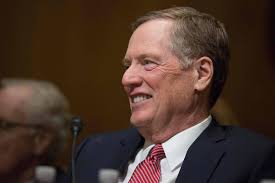The Trump administration plans to impose tariffs worth as much as $60 billion on Chinese products as early as this week to punish Beijing for what the U.S. perceives as intellectual property theft from American businesses, according to two people familiar with the matter.

U.S. Trade Representative Robert Lighthizer is leading an investigation into China’s treatment of intellectual property, and policies that the U.S. believes force American companies to turn over their technological know-how as the price of doing business there. The administration is said to be considering wide-ranging tariffs on everything from consumer electronics to shoes and clothing made in China, as well as restrictions on Chinese investments in the U.S., according to people briefed on the matter.
The U.S. Trade Representative’s office didn’t immediately reply to a request for comment.
The Washington Post reported earlier Monday that the administration planned to impose $60 billion worth of tariffs by Friday, after the president rejected a proposal by his officials to levy $30 billion in duties.
Record Deficit
Sweeping U.S. tariffs will test the resolve of Chinese President Xi Jinping, whose government has so far reacted in a measured fashion to Trump’s repeated complaints about the U.S.’s record $375 billion deficit with China. The country’s foreign minister said earlier this month, in response to Trump’s decision to impose steel and aluminum tariffs, that China would have a “justified and necessary response” to any efforts to incite a trade war.
Chinese Premier Li Keqiang said on Tuesday that the nation will further open its economy, including the manufacturing sector, and pledged to lower import tariffs and cut taxes. In opening manufacturing further, China won’t force foreign companies to transfer technology to domestic ones and will protect intellectual property, he said.
“With China’s economy so deeply integrated to the international economy, shutting the door would only block China’s own way,” Li said during a news conference at the close of the annual National People’s Congress in Beijing.
U.S. companies from Walmart Inc. to Amazon.com Inc. warned Trump this week that any sweeping trade action against China could raise consumer prices, increase costs for businesses and hurt stock prices.
‘Chain Reaction’
Broad-based tariffs on Chinese goods would “trigger a chain reaction of negative consequences for the U.S. economy,” a coalition of more than 40 business groups led by the Information Technology Industry Council said Sunday in a letter to the president. The coalition includes groups representing retailers and makers of everything from toys to wine, while the council represents companies including Amazon, Alphabet Inc.’s Google, Facebook Inc. and Microsoft Corp.
Lighthizer has been probing China’s IP practices under section 301 of the Trade Act of 1974. The law allows Lighthizer, at the president’s discretion, to take broad steps, including tariffs, to correct against any harm against U.S. businesses.
The USTR has argued that China uses a range of practices to force companies to transfer IP, and Chinese entities engage in widespread theft of U.S. trade secrets, as it seeks to become a leader in advanced manufacturing and artificial intelligence. U.S. businesses in China have long complained about being forced to hand over technology as the price of gaining access to the market.
U.S. Treasury’s undersecretary for international affairs David Malpass has ramped up his criticism of China in recent months, saying the country’s drive for economic liberalization has stalled, and in some instances reversed. The White House in December lumped China with Russia as powers seeking to weaken U.S. security and prosperity.










